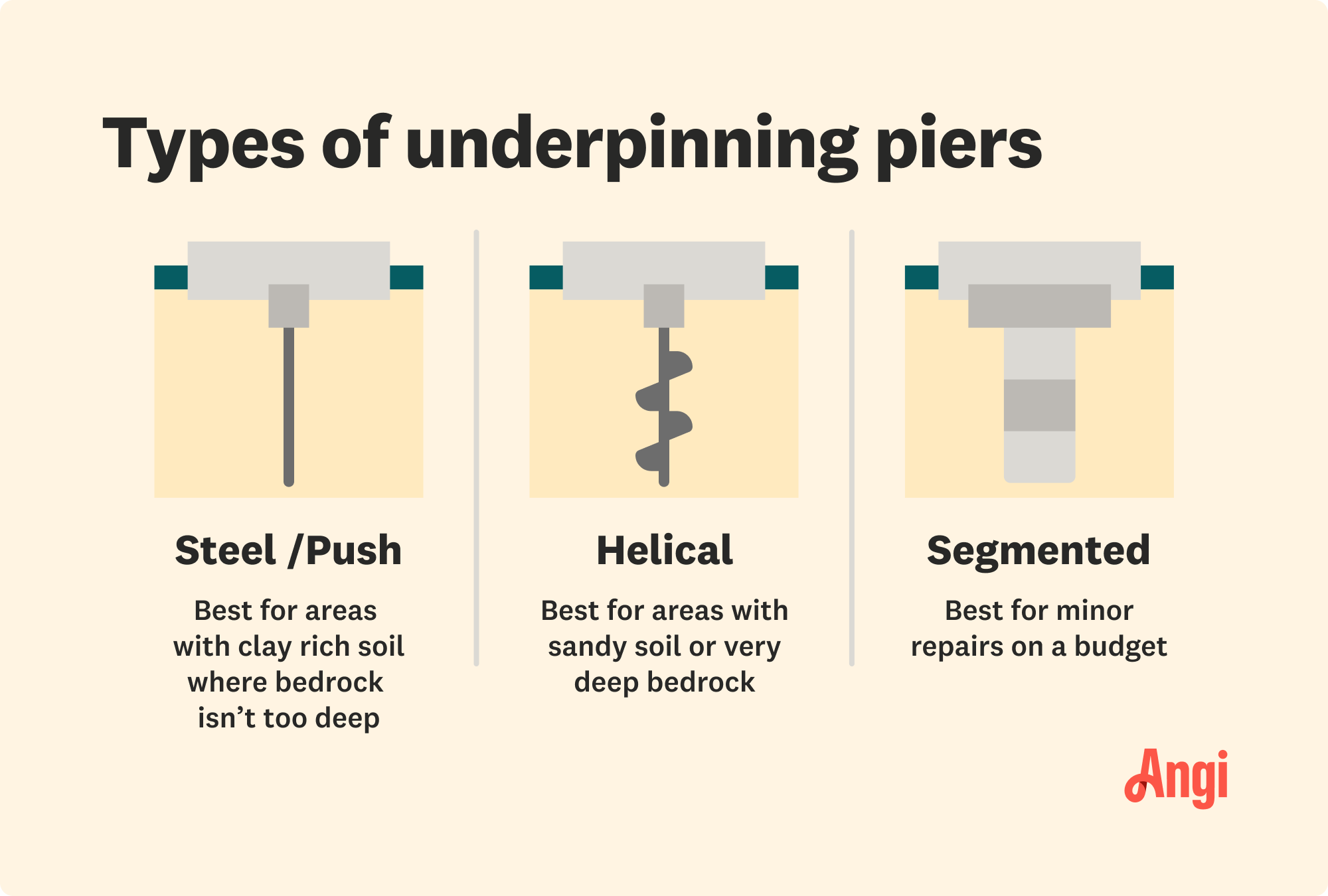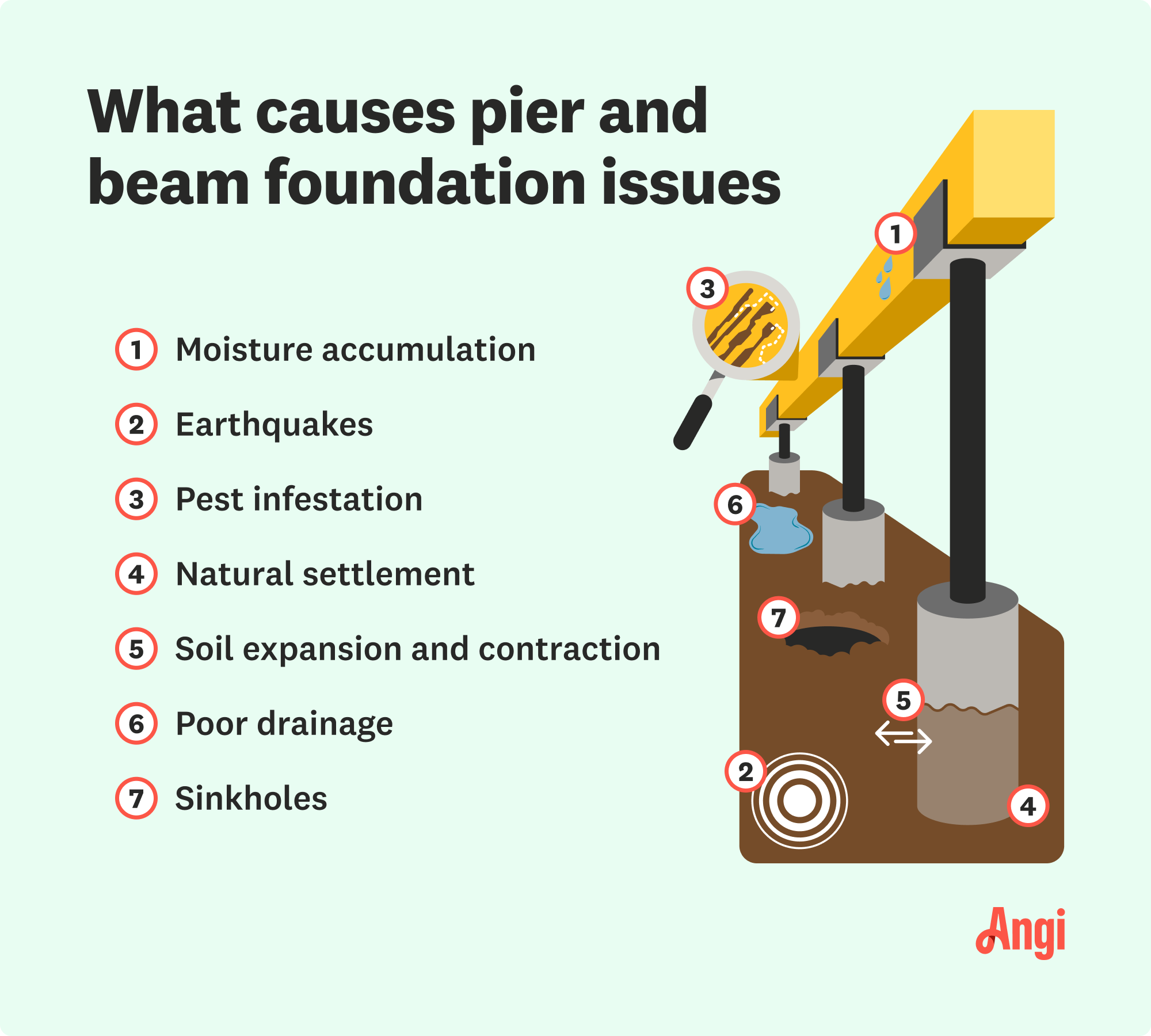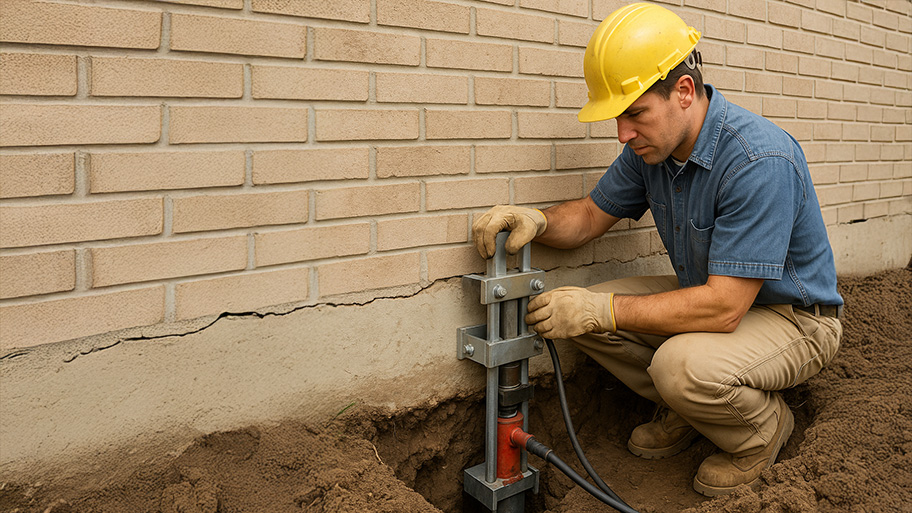
Unstable or sinking foundations require comprehensive and expensive solutions. Learn about foundation underpinning costs in this guide to set your budget.
Foundation repair costs depend on your project and location. Check with a local pro for your specific job.
Pier and beam foundation repairs cost an average of $10,000, but you could pay anywhere between $800 for a simple fix-up to $25,000 for structural repairs and foundation waterproofing. In this guide, we’ll discuss how to determine your foundation repair costs to help you budget more appropriately, and we’ll also share some tips on how to save money in the process.
Pier and beam foundation repairs can cost anywhere from $800 up to $25,000, and where inside that range your repair falls will depend on a number of factors.
The type of repair you need for your pier and beam foundation will be the most significant factor when it comes to the repair cost.
| Repair Type | Typical Cost |
|---|---|
| Adding new piers | $800–$4,000 ea |
| Beam replacement | $400–$1,200 ea |
| Replacing piers | $2,000–$6,000 ea |
| Reshimming | $1,200–$4,000 |
| Underpinning | $1,000–$3,000 ea |
| Waterproofing | $3,000–$20,000 |
You can expect to pay around $2,000 to add a new pier to your pier and beam foundation or anywhere between $800 and $4,000, depending on a few factors.
Adding a new pier is a great way to provide additional support to your structure if the original number of piers installed was insufficient or if you’re building an add-on and need additional support for a specific section of the adjoining structure. In some cases, installing additional piers can be an option to take the load off of existing ones that would otherwise need replacement.
The cost to replace a beam in your pier and beam foundation sits around $800 on average or between $400 and $1,200 per beam. For a typical home with 10 to 12 beams, you’re looking at a total cost of between $4,000 and $12,000 to replace all of the beams.
Replacing an existing beam is a relatively straightforward process that involves jacking up the portion of the home above the affected beam, detaching it from the floor joist above and the pier below, and installing a new beam. No excavation is necessary, so this is a more affordable process than replacing a pier.
Replacing a single pier will cost an average of $3,000, but your total could fall anywhere between $2,000 and $6,000, depending on a few factors, like accessibility and the depth of the pier, which is determined by the frost line in your area.
Replacing a pier involves your foundation contractor getting under your home, jacking up the area around the pier, excavating the existing pier, and installing a new one before redistributing the load from the beam onto the new pier. The process is quite involved, and the foundation repair timeline can last several days, which means the labor costs can be high if your underhome area provides minimal space to maneuver equipment.
The average cost of reshimming your piers and beams is around $1,600, and most reshimming jobs total between $1,200 and $2,000.
Reshimming involves a foundation repair contractor inserting steel shims between the concrete piers and the beams or between the beams and floor joists. The goal of reshimming is to make minor adjustments to specific areas of the foundation where some settling or sinking has taken place. Your foundation repair cost will depend on how many piers need shimming, how many shims are required per pier, and how your piers are connected to your beams.
Underpinning a foundation costs between $1,000 and $3,000 per pier you need, with an average total project price of around $8,000 and prices usually totaling between $2,000 and $20,000.
Underpinning is the process of installing long pilings beneath the pier and beam foundation footings. The piers are designed to redistribute the weight that the footing would normally hold further down into the ground, where soil expansion, contraction, and freezing are less of a risk.
There are a few different kinds of piers your contractor can use, depending on your soil consistency, how far down the bedrock is, and your proximity to an underground aquifer. The most popular ones are steel piers (also called push piers), helical piers, and segmented piers.

Segmented piers usually cost around $1,000 each, steel piers are around $2,000 each, and helical piers, ideal for sandy soil, cost around $3,000 each.
“Waterproofing” a pier and beam foundation can cost as little as $3,000 if you want to apply a water-resistant application over the underside of your foundation. However, the total can climb well over $20,000 for extensive measures, like enclosing the area with a concrete block wall and installing a foundation drainage system, like a French drain or sump pump.
If you’re running into issues with indoor humidity, you might be able to get away with a simple and inexpensive sealant application. If you want to build a concrete block wall to encapsulate your underhome area, the work will be much more involved and costly. Your contractor will need to build the block walls and install vents, and installing a sump pump or other foundation drainage system can add to your cost as well.
If you already have a concrete block perimeter wall installed, then waterproofing might just involve sealing foundation cracks and installing a drainage system, which could fall between $200 and $800 per crack and around $10,000 for a drainage system.
The larger your home, the more likely you’ll need to repair, shim, or replace multiple supports below. This is especially true since the center piers are the most likely to settle and shift due to the heavier load, and larger homes naturally have more piers in the center than around the perimeter.
Although pier and beam foundation repair cost per square foot can vary widely, you can expect an average price of between $6 and $8 per square foot. Prices per square foot can be as low as $0.50 or as high as $17.
Depending on the repair method, the soil quality—sandy, loamy, or clayey—can affect your foundation repair costs.
Installing three to five piers in clayey soil where bedrock is close to the surface and steel piers are suitable will cost between $6,000 and $10,000, while installing the same number of supports in sandy soil would cost between $9,000 and $15,000.
Soil quality may not change the cost of some other pier and beam foundation repairs, like shimming, but it can increase the frequency with which you need the repairs. Highly expansive clay soil that increases and decreases in volume rapidly will lead to more differential settlement than loamy soil, which could mean you’d need reshimming every two or three years as opposed to every three to five years.
The more extensive the damage your foundation has suffered, the more expensive your repair costs will be. Pier and beam foundation repair for minor shifting and settling can total under $1,000 for reshimming, while installing reinforcements for major settling and sinking can easily top $20,000.
Soil expansion and contraction in areas with clayey soil are the most likely to require structural repairs like underpinning, so soil composition issues will often be more expensive than something like reshimming, which is more likely a suitable solution in areas with loamy soil.
Underlying moisture issues are the most expensive repairs because you’ll need costly preventative measures like installing waterproofing. You’re also more likely to need pier and beam replacement due to rotting from moisture or damage from pest infestation.

Many types of foundation repair require building permits, which can add a few hundred dollars to your repair costs. Minor repairs like reshimming might not need permits at all, but most municipalities require building permits for anything involving excavation or structural repairs. Underpinning, beam replacement, pier replacement, and installing high-end waterproofing systems like French drains will often demand permits.
All foundation repair contractors should address the underlying issue and not just patch the problem. A moisture issue that might demand sealing your underhome area can cost up to $25,000. If natural shifting and settling is the cause of the issue, you might spend $1,000 to $8,000 to install a gutter system to limit the effect of runoff on soil movement around your home.
Here are some standard costs for additional services:
| Service | Normal Cost |
|---|---|
| Dehumidifier | $1,000–$4,000 |
| Encapsulation | $12,000–$20,000 |
| French drain | $8,000–$25,000 |
| Gutter system | $1,000–$8,000 |
| Insulation | $2,600–$5,500 |
| Soil gradation | $500–$1,000 |
| Sump pump | $1,200–$2,500 |
A pier that needs replacement in the center of your home might require additional time and special equipment to remove, while a pier around the perimeter of your home will naturally be more accessible and will cost less due to lower labor costs.
You may also need to consider the landscaping features around the affected area, as you could tack on hundreds or even thousands of dollars to your total if excavation around a pier under your home will interrupt a patio, deck, or some other structure.
It’s often difficult to decide if a pier and beam foundation needs repair or if parts need total replacement. Generally speaking, if you’re noticing signs of an uneven foundation inside your home—like an uneven or sinking floor, cabinets pulling away from walls, or large cracks forming in the drywall around wall openings—then at least a partial replacement is probably best. Similarly, noticeable insect or water damage on the wooden components under your home will likely require replacement.
You could just need minor repairs, though, if you notice sudden creaking of the floors inside or unlevel floor joists under your home during a foundation inspection.
In either case, we recommend calling in a foundation repair company near you to assess the issue, as foundation problems can sometimes be more involved than they seem on the surface.
When it comes to the structural foundation of your home, you should always hire a foundation repair pro near you. This is not the type of weekend project for which you can just watch YouTube videos for and feel confident tackling it on your own.
Whenever you need to repair your pier and beam foundation, you need to call in an experienced, certified foundation repair professional. Here’s why:
Working on the actual foundation of your home poses major risks for the structural integrity of the building. Only experienced professionals should attempt this kind of work.
Pier and beam foundations are difficult to access. Professionals have the necessary tools and experience to safely and efficiently excavate and replace existing piers and beams.
Local building code usually requires that only certified professionals work on home foundations.
Pros have a fundamental understanding of the physics behind how foundations work; homeowners typically don’t have that same knowledge and can make costly and dangerous mistakes by tackling the work themselves.
Before you can repair your foundation, you need a real understanding of what’s wrong; pros are better suited to inspect the pier and beam foundation and determine the issue—and the proper course of action to fix it.
Pier and beam foundation repair companies carry liability insurance in case of expensive mistakes, and they may also offer warranties on their labor.
"Safety is key when working around foundations, crawlspaces, and basements. Always wear protective gear like gloves, masks, and goggles, and ensure proper ventilation. Minor tasks like filling small cracks and basic inspections can be DIY projects, but leave structural repairs, extensive waterproofing, and significant drainage work to the pros."
— Tim O'Shea, The Build Pros
Pier and beam foundation repair costs can get expensive quickly, especially if you need a multifaceted approach to solve the issue. There are a few things you can do to help keep costs down as you get your foundation issues fixed.
Address the underlying problem. Foundation damage doesn’t just happen for no reason, and unless you find and fix the underlying issue, you’ll end up paying far more down the road for ongoing repairs. Solving drainage issues, moisture problems, or soil composition issues can be expensive up front, but it’s almost always worth it in the long run.
Carry out routine maintenance. Pier and beam foundations need more maintenance than many other foundation types, and keeping up with that maintenance with annual foundation inspections and routine reshimming can prevent the need for some of the more expensive repairs, like pier replacement, beam replacement, and even underpinning.
Install a gutter system. Proper soil drainage is one of the most crucial things for foundation health, and a gutter system is a simple but effective solution for good drainage. Make sure you have gutters, downspouts, and downspout extenders installed to minimize soil expansion, moisture issues, mold growth, wood rot, and pest infestation in and around your foundation.
Don’t relocate during the repair. In some cases, it might be easier to relocate during foundation repair to get away from the noises and distractions. However, in most cases, you can live in your house during foundation repair, and doing so will save you money on alternative living arrangements.
Get multiple quotes. Finally, get at least three quotes from local professionals to compare based on cost and value. This can help you avoid unnecessarily high pier and beam foundation repair costs from an overpriced contractor in your area.
Discuss a timeline for the project and whether the contractor recommends that you and your family relocate elsewhere during the work, especially if it will be loud and dusty in frequently used areas.
Ask the foundation team if they can explain what led to the issue and how you can prevent it in the future. For instance, there may be drainage or soil composition issues you can address.
Create a plan to obtain the permit. Will the contractor handle this, and is that already reflected in their quote?
Home is the most important place on earth, which is why Angi has helped more than 150 million homeowners transform their houses into homes they adore. To help homeowners with their next project, Angi provides readers with the most accurate cost data and upholds strict editorial standards. We extensively research project costs to develop the pricing data you see, so you can make the best decisions for you and your home. We rely on reputable sources, including the U.S. Bureau of Labor Statistics, academic journals, market studies, and interviews with industry experts—all to ensure our prices reflect real-world projects.
Want to help us improve our cost data? Send us a recent project quote to [email protected]. Quotes and personal information will not be shared publicly.
From average costs to expert advice, get all the answers you need to get your job done.

Unstable or sinking foundations require comprehensive and expensive solutions. Learn about foundation underpinning costs in this guide to set your budget.

Whether trying to protect it or transport it, raising a house is no small feat. Read on to find out everything you need to know about the cost to raise a house.

A bowing basement wall needs immediate repair. Learn how much it costs to repair a bowing basement wall and what factors can affect the final price tag.

When constructed correctly, a concrete foundation can last more than a century. Learn what factors influence how long a concrete foundation can last.

A sinking foundation can compromise the safety and structural integrity of your house. Learn what signs to look for and what to do if you find them.

Unsure if a crawl space or a basement foundation is better? Learn about the pros and cons of each, how they compare, and which is better for your home.